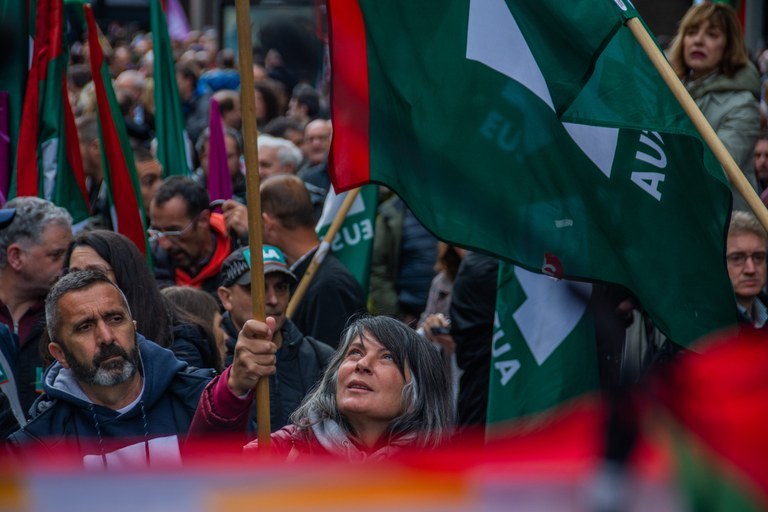ELA registers a request for an agreement with Confebask and CEN regarding a own minimum wage for Hego Euskal Herria

On the 8th of January, ELA, LAB, ESK, Steilas, Hiru and Etxalde presented Popular Legislative Initiatives (PLI) in both the Basque Parliament and the Parliament of Navarra. Within the framework of the agreement reached by all the trade union organisations mentioned, today, on the 14th of January, ELA has requested the employers’associations Confebask and CEN for an Interprofessional Agreement (IA) to agree on a own Minimum Wage.
Even when they are starting out from different points, the Popular Legislative Initiative and the Interprofessional Agreement may form complementary channels, as the adhesion generated to the former puts pressure on the employers’ associations to agree on an IA and the negotiation of an IA can contribute to modifications in the legislation taking place.
According to the latest data from the INE (National Statistics Institute), the Gross Domestic Product per capital in the ACBC is 39,547 euros, and that of Navarra is 37,088 euros; on the other hand, the one for the State is 30,968 euros. Likewise, the average salary for the ACBC is 32,313.73 euros, and that of Navarra, is 29,189.52 euros; while the one for the State is 26,948.87 euros.
This data clearly indicates that the socio-economic structure of Hego Euskal Herria is different and that, in terms of the prices in Hego Euskal Herria, the Spanish minimum wage is not reasonable to be used as an instrument to share out the wealth, nor to ensure that people who are working manage to cross over the poverty threshold. For example, the Basque Government itself admitted in a report on poverty published in 2022 that in order to be able to live satisfactorily in the ACBC, an annual income of 19,848 euros is necessary and the minimum wage fixed in Spain is way below this amount (in 2024, two years later, it was 15,876 euros, and in view of the current debate, in the most optimistic scenario, it will increase to 16,576 euros in 2025).
Therefore, both the PLIs and the IAs share the same aim: to establish a minimum wage in line with the needs of the working class of Hego Euskal Herria, which could be an effective mechanism for sharing out the wealth and lifting people who work there over the poverty threshold.
Finally, ELA is requesting the Basque Government and the Government of Navarra to defend a regional minimum wage. If the governments want the minimum wage to reach a suitable level, they must put pressure on the employers’ associations and the best way to do this is to make it clear to them that if they do not sign the interprofessional agreement, they will defend the idea that the minimum wage will be regulated here in the ACBC and that, consequently, they will support the PLIs presented by the trade unions. In turn, it is in the hands of the governments to guarantee that the workers within their area of responsibility, be they directly hired or outsourced, are paid a decent minimum wage.
